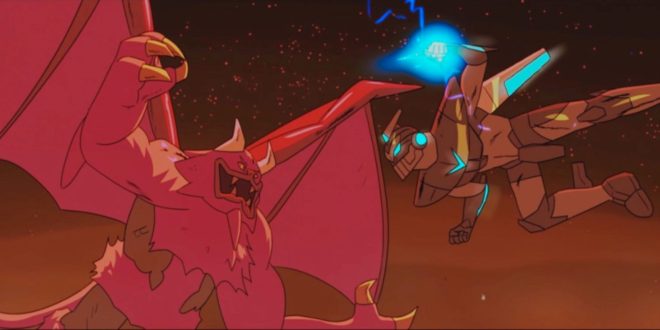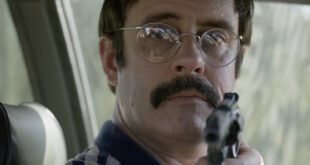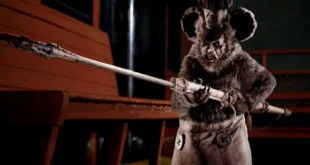Due to technical/recording issues, we are unable to post the video or audio of this Zoom interview. Please enjoy our transcribed version of the interview with the lovely cast and crew of the upcoming film, Iké Boys, from debut director Eric McEver in his feature debut and cast members Quinn Lord (Trick r’ Treat), Ronak Gandhi (Lucifer) and Christina Higa. The world premiere will be this Sunday, September 26, 2021, at Fantastic Fest. I hope you look forward to our review of the film shortly after!
Synopsis for Iké Boys:
Two self-proclaimed geeks and a live-in Japanese foreign exchange student procure a long-lost anime classic that inadvertently turns them into superheroes… just in time for a Y2K-era Kaiju face-off!
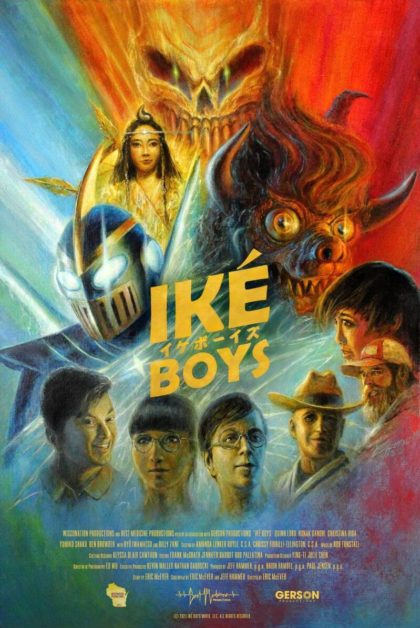
PopHorror: Before we get going, I want to say that this movie was a hell of a lot of fun. I enjoyed it and all of your performances, and it very much seemed like I was the demographic you were going for (points to Godzilla shirt). On that note, let’s start with a quick question for Eric: it’s clear Iké Boys takes from a pretty big set of inspirations and even has some direct shout outs. Were there any major ones that came to mind during the development and production phases of the film?
Eric McEver: Well, the way I went about it, I wanted to make a story about a life in the world that is unique, that no one else could make in terms of specific Japanese films. So I gave [Neon Genesis] Evangelion as homework. There is certainly a dose of that. I can’t pick just one. It being set the late 90s, there’s both some overt and subtle references to films and comic books within like from the Gamera trilogy. And he actually has a cameo in the opening scene, so that would probably be the most direct of the kaiju-related references… everything in [Shusuke, the trilogy’s director] Kaneko’s wonderful photography.
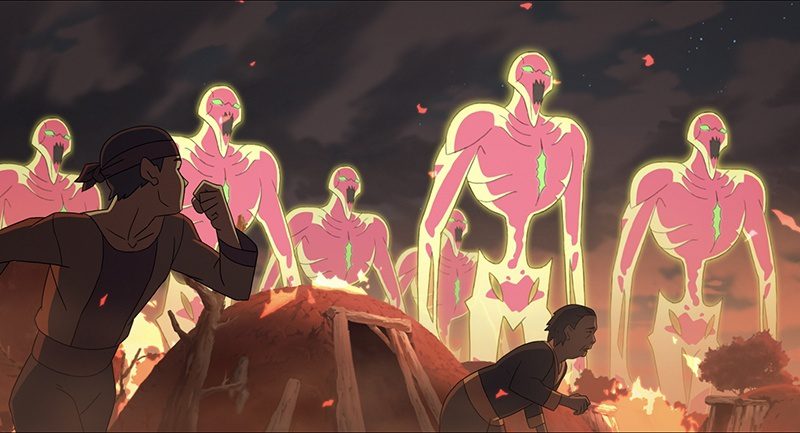
PopHorror: And for the cast: This is very much a 90’s nostalgic film. Did you three have to do anything special to prepare for the film, or did you choose to do anything special?
Quinn Lord: Well, I was born in ’99, so it’s interested to return to my birth year all grown up. As far as research for doing a film set in the ’90s, I tended to listen to a lot of what my parents would feed me as a kid, so it was a lot of baby music. Some ’90s music here and there. I had some of the homework done just by my childhood upbringing, so I don’t know if that helps with my quick majority as a young, young guy, but…
PopHorror: Any choice ’90s tracks you want to share?
Quinn Lord: I ended up gravitating a little bit more towards media and the early 2000s music genre, just because I remembered living through that rather than just listening to the ’80s and ’90s.
PopHorror: Okay, fair enough. Ronak or Christine?
Ronak Gandhi: I didn’t really have to do a lot to connect to the ’90s. I had a lot of family from the ’90s, and I grew up partly in the ’90s, so I watched a lot of movies from the ’90s. It was a good synergy to do. Also, Eric created great atmosphere of the ’90s and helped us out a lot to adhere to the script a lot of the time, so I thought it was a pretty seamless transition.
PopHorror: I thought so, too this and Psycho Goreman [read the PopHorror review here] were really strong reminiscence of those kind of classic Amblin films with a nice modern spin. I enjoyed them both.
Eric McEver: Kind words! I love PG! Thank you!
Christina Higa: I didn’t really have to do that much research into that. I was like five, but I also listened to a Walkman CD, which you know Miki listens to with her headphones. It was kind of nostalgic. I love the ’90s. I get a lot of aesthetic inspiration from the ’90s. Very proud to be a ’90s baby. It was cool to be a part of it.
PopHorror: So, the movie does bridge on cross cultural mixing and stuff. And in this day where cultural appropriation is discussed a lot, I want to have this be an open forum discussion. Anyone can respond whenever they want, open question. How did you approach the film and your role to make sure it didn’t cross the line? I think you all did a good job, but I want to see how everyone approached it.
Quinn Lord: I’m fairly certain that [my character] Shawn wasn’t really too close to crossing any line because he doesn’t really know Japanese language that well, but he really appreciates the movies and TV and anime. So he’s just surrounding himself with that culture. He wants to move to Japan, so I don’t think that’s harmful. I don’t know too much about it, but I don’t think that it’s really too bad.
Ronak Gandhi: I’ll jump in here. What I felt I really liked about this was that even though my character was Indian-American, the character itself wasn’t based off just that. There weren’t a lot of characteristics of Vik [Ronak’s character] that stemmed from him just as an ethnicity, and that’s something I really enjoyed. I know there are some other like subtleties and allusions and, I guess, misunderstandings. I’ll let the viewers see, but at least for me personally, it is one thing that I gravitated towards that I feel my character wasn’t just based off of just one aspect, that there could be a three dimensional person as I am, and it just exists as myself on screen. So, I didn’t really feel that appropriating happening, although it could have! You know, [Director Eric McEver] was very good about being open about that, talking to me about, what was right or what’s wrong. Can we fix it? Can we do this? So I would say that it was a testament to him being open to some feedback, and also need to be the voice of what it is to be a 16 year-old.
Christina Higa: Yeah, and as far as [my character] Miki, I felt well about it after talking to Eric for the first time. For this project, I knew he actually genuinely understands Japanese culture. I grew up in Tokyo, around a lot of kids like Miki as well. I taught English with my mom for kids who couldn’t speak English well and so to be able to play a role and be like, “I know this culture. I want to represent it properly.” I feel like her personality is definitely true to a lot of Japanese girls, but it’s cool because she has a lot of depth to her character in the sense that she wants to branch out and go on this spiritual vision quest and has this courage, even though she’s a very shy, shy, timid girl. And I also think the movie touches on how she wanted to go meet Native Americans and call them Indians in Japanese. That mix up that exists between cultures and language barriers, and there is that shock when you realize like something’s not what it is and it touches on that, but I think in a very genuine way.
PopHorror: Yep, fully agree.
Eric McEver: Thank you for the question. Currently for me, as the leader, it came down to two things which I think are interconnected. One was just to ask questions and to listen and to just try to make a discipline of not being in my own head about how I thought things were but try to figure out how they actually are, how other people perceive things. So it’s a lot of asking questions and then really listening to what people have to say. The other thing in the film, like the kids, it’s not like they’re coming at the same path in different directions. They’re all very interested in one another and in what they perceive as far away exotic things and places. They get a lot of things wrong, be it linguistically or culturally, or they make a lot of pretty endearing mistakes. And I think one of the things that was important to convey is that it’s okay to make those mistakes as long as you’re trying, because the thing is, they are really trying to understand one another and to connect and to appreciate how they see the world. And so I think the important thing is to try to listen to try to understand how other people see things.
PopHorror: Yeah, that’s a perfect way to summate! And I think your movie hits it perfectly, and all three of you conveyed that excellently. Originally seeing the synopsis, I honestly worried a little about it, especially with Ronak’s character. I was really worried he was going to hit an outdated ’80s stereotype, but no, he’s got his own character flaws and stuff like you said, but he doesn’t slide into those.
Eric McEver: Certainly didn’t want to fall into that crack. It’s an easy trap to fall into. And part of it is just, whether we know it or not, we are all prone to stereotypes and preconceived notions. And I think it’s a constant process. And I think it’s a process, and we should always be working at it.
Christina Higa: And I also just I feel like a big reason why we didn’t fall into that was because of the casting. We are all genuinely of that culture and can understand where it comes from and can add our own character and depth to it, because we’re not trying to put on too hard of a certain culture. So, yeah, I feel very genuine.
Eric McEver: Christina, I think you you would have your own take on this. I’ve lived in and out of Japan for over a decade at this point. And it was a lot of work to become really fluent Japanese, and I remember the first couple of years, I was so bound and determined to really get everything right, to know all the right words, the right brainwork, or the right way of expressing thoughts as close to a Japanese person as possible. That work paid off. And you know Bulpitt, linguistic, and cultural fluency. It was interesting because they reached a point four or five years into my life and career in Japan where people started commenting like, “You’re getting Japanese in an uncomfortable way. You don’t need to act that Japanese. The language is fine because you are American. Just be embrace who you are as an American, and people will be more comfortable with that. That was an interesting, pretty powerful revelation for me because my takeaway was, at a certain point, about trying to listen and trying to understand, but also I think if you present yourself as what you are, and as comfortable in who you are, that helps other people open up and be themselves around you.
PopHorror: Okay. There we go. And then, yeah, I just have one more question. It’s just a fun one. If you each had to choose from the archetypes presented in the film to become, which would you choose Kaiju, Mecha, or the Sage/Goddess?
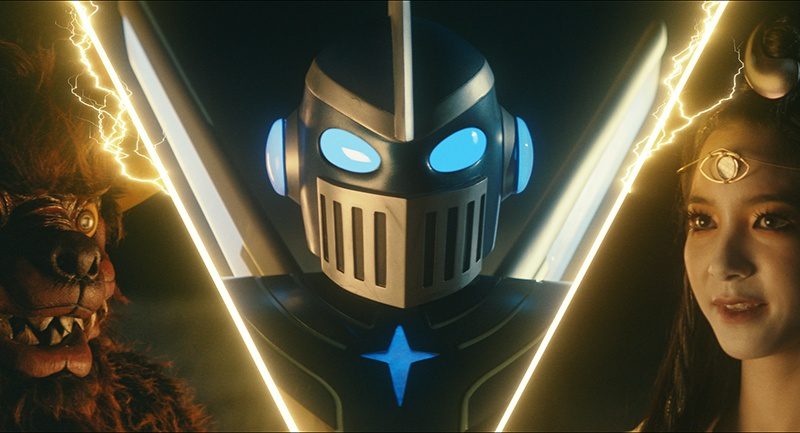
Quinn Lord: I think this is kind of a loaded question because of the way we were cast! (chuckles)
PopHorror: Well hey, you can choose differently from how you were cast!
Quinn Lord: But I don’t want to…
Ronak Gandhi: I can’t, I can’t. I’ll just play it safe, I’ll just say Kaiju…
Christina Higa: What, come on!
Ronak Gandhi: If there’s one other I could do if it wasn’t me, I probably would be the Goddess. She’s the center of it all and can embody the best of all three of us. So I would say the Goddess. Ladies first, right?
Christina Higa: I would definitely be the Goddess. I just love her.
Eric McEver: You are the Goddess!
Ronak Gandhi: Christina still is the Goddess.
PopHorror: Now the spotlight’s on you, Eric.
Eric McEver: So, my most cherished ambition is to travel back in time and live the rest of my days amongst the dinosaurs. And I think in order to achieve that ambition, I would need some Mecha skills, Goddess skills and Kaiju skills. So, I would, I would try to have the sampler platter.
PopHorror: Okay, so you’d be the the giant spoiler thing!
Eric McEver: (enthusiastically) Oh, you want me to tell you the name of it? The name of the giant spoiler thing is Ikenjer, Ike as in Iké Boys and the jer part comes from ranger.
PopHorror: This isn’t even a question but as a general fan I do appreciate the transformation and slogan, just “Henshin!” Just as just as a toku fan. A plus. Yep.
Eric McEver: That’s been a bit of a running joke among us for the past bit. Quite a few texts exchanges with “Henshin!” in it. Nice.
Quinn Lord: It’s how Eric will sign off on emails.
Christina Higa: I hope that other viewers pick up on it, too!
PopHorror: Perfect. Do you mind if I include that in the interview?
Eric McEver: Oh no, absolutely. Would you like us to do one for you?
PopHorror: Oh! Yes, please!
Eric McEver: I’ll count you down. Three. Two. One.
Christina, Ronak, Quinn: Hennnn-shiiin!
PopHorror: Thank you! Thank you! That was awesome! It was lovely speaking with all of you. And I can’t wait for this to get a wide release, I’m going to be talking to all my friends about it.
Eric McEver: Thank you so much, and by the way, you picked the correct team. (Points to my Team Godzilla shirt from Godzilla vs Kong)
PopHorror: Thank you. Thank you. I know it’s the king, the true king.
 PopHorror Let's Get Scared
PopHorror Let's Get Scared
